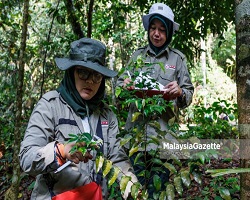Mohammad Nazrin Abdul Malik
Tropical rainforests are widely recognized as the most biodiverse ecosystem in the world. Tropical rainforests are remarkable in terms of both forest structure and biodiversity. They play a vital role in global climate regulation, carbon sequestration, biological conservation, and timber production. Since tropical forests are regarded as the most productive of terrestrial ecosystems, they are important for climate regulation and soil conservation. Although they occupy only six percent of the Earth's land area, tropical rainforests provide habitat and shelter for more than fifty percent of all identified species and act as a major provider in terms of forest products and ecosystem services worldwide.
In recent decades, growing demand for timber supply has led to the clearing of extensive areas of tropical rainforest. Land clearing and timber harvesting increase soil compaction and can cause negative impact on the soil fertility and productivity, thus reducing the survival rate of remaining trees. Deforestation activities such as large-scale conversion of forest areas to other land uses, timber exploitation, and illegal logging have negatively impacted natural ecosystems, biodiversity, and climate. These disturbances alter ecosystem structure and functions. Because plants "breathe" and "sweat," they help cool the earth's atmosphere. Exploitation of forests through tree removal could lead to global warming. For example, when trees are removed on a large scale, the forest canopy is destroyed because of its function that obstructs the sun's rays during the day to the forest floor and retains heat at night. Such unexpected disruption could lead to temperature fluctuations that could adversely affect plants and animals, as 80% of the Earth's biodiversity lives in forests, and threaten endangered species such as the orangutan and Sumatran tiger.
Since deforestation contributes about twenty percent of annual global greenhouse gas emissions, its reduction is vital to avoid dangerous climate change. Forest carbon stocks comprises about eighty percent of the above-ground terrestrial carbon and forty percent of below-ground terrestrial carbon. Throughout the globe, there are five carbon pools such as oceanic pool (largest pool), pedologic (soil), geologic, biotic, and atmospheric pools. According to Lal (2004), soil organic matter represents the third largest terrestrial carbon pool. Soil organic matter and trees in forests store carbon in different ways. Deforestation of trees could affect the carbon cycle by releasing the stored carbon as carbon dioxide into the atmosphere. Trees help regulate climate change by removing carbon dioxide (CO2) from the air through the process of photosynthesis, capturing carbon in soil and trees, and releasing oxygen back into the atmosphere. Increasing heat and wildfires, drought, insect infestations, lower agricultural yields, and impacts on human health are the harmful consequences of climate change. Climate change threatens communities with economic losses, food and water shortages, extreme heat, increased flooding and public health that could result in conflict and human migration. The World Health Organization (WHO) noted that climate change is the major threat to global public health in the 21st century.
Thus, ecosystem restoration, such as reforestation and restoration of degraded land, could therefore be considered one of the most important responses to climate change, as replanting trees could help to influence the global carbon cycle. Since climate change is a serious problem, many efforts have been made to address it.
At the global scale, there is a framework introduced by parties to the United Nations Framework Convention on Climate Change (UNFCCC) known as Reducing Emissions from Deforestation and forest Degradation (REDD +). This framework provides incentives for developing nations to reduce emissions from forested areas and investing in low carbon pathways for sustainable goals thus generating an economic value for forest carbon stocks. These developing nations will be credited payment based on their results for their actions in reducing emissions. REDD + initiative goes beyond mere forest degradation and deforestation to include the sustainable forest management, role of conservation, and increasing the carbon stocks through ecosystem restoration.
Another new initiative is the carbon offsets program. Offsets are an effective and practical approach to address climate change issues, to achieve sustainable goals and encourage the growth of renewable energy. Offset programs allow companies and individuals to invest in projects focusing on the environment around the world to offset their own carbon footprint. Carbon footprint is defined as the total amount of CO2 and other greenhouse gasses produced by a person's or company's activities. It includes both direct andindirect emissions. Environmental projects usually will be carried out in developing nations and usually aim to reduce future emissions. This usually involves the purchase and sale of carbon credits from an emissions trading scheme and introduction of clean energy technologies. There are other projects such as tree planting programs to absorb CO2 directly from the air.
Tarikh Input: 03/08/2022 | Kemaskini: 03/08/2022 | masridien
PERKONGSIAN MEDIA




























